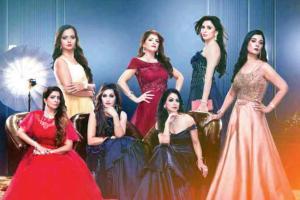New reality TV show proves how parody is all that remains of what was once called 'Page 3' sub-culture!

A promo-still from Zee TV's Dilli Darlings, which is tag-lined, "Dekhiye, Dilli ki high-class ladies ka real-life drama!"
 Soon as we sit for a quick chat, Manya Pathak yelps, "It's the greatest day of my life!" Does look like it (I don't tell her). Pathak is dressed in a white dress with a long, flowing train, that I noticed an assistant holding up in his hands walking behind her, as she went up hotel steps for the launch of Zee TV's reality show, Dilli Darlings.
Soon as we sit for a quick chat, Manya Pathak yelps, "It's the greatest day of my life!" Does look like it (I don't tell her). Pathak is dressed in a white dress with a long, flowing train, that I noticed an assistant holding up in his hands walking behind her, as she went up hotel steps for the launch of Zee TV's reality show, Dilli Darlings.
ADVERTISEMENT
Manya is one of the participants on the reality show that premiered last night. As is Shaloo Jindal, from Pitampura in West Delhi, who moved from her Ashok Vihar home, she tells me, as soon as her parents married her off at "a very young age" (right past teenage). She spent most of the years after, taking care of home, and raising family. Now that the kids are older, she wants to explore life anew.
This part of Shaloo's story is actually quite similar to Manya's, and one suspects just as true for not just other participants on the show, but many middle-aged Indian women, particularly in small-towns, who have been exposed to a lot more experiences that money can buy—a life of fashion, travel, leisure, pleasure… And now they have the time and bandwidth for it, which was perhaps in shorter supply earlier. But, more importantly, because they have filthy amounts of money to spare.
What do they wish for going ahead, now that they're already rich? To be famous. How? Starring in a reality TV show, along the lines of say the (American) Real Housewives (of New York/Orange County/Atlanta), and its several spin-offs, or Basketball Wives, or even Keeping Up With The Kardarshians, or Bigg Boss, if you may.
These shows aren't as much centred on displaying/consuming talent, as on audiences deriving voyeuristic, guilty pleasures—viewing lives of people, who are only too willing to open their doors, windows, hearts and minds for the public, in a way that your neighbours won't! 'Trashy' is a proper TV genre, with potentially high ratings. And, yet, Dilli Darlings is so culturally specific that I can't help but be drawn to it, having grown up inevitably observing a 'saddi', gaudy Delhi—North India's capital, before India's itself!
Here's what you ought to know about this show, or the sense I got, having caught two episodes of it so far. Ladies who lunch here—replace that with "kitty parties" and "events"—belong to the Capital's 'Page Three'. "What's Page Three?" You might ask, if you're a post-millennial. Late '90s/early 2000s equivalent of an Instagram celeb? Quite right.
More specifically, Page Three was a page designed to feed coloured supplements of mainstream, metropolitan newspapers. The supplements were in turn brought out to print ads of fresh consumer products entering a newly liberalised India, since hot/cool images peddling Lux or Coca Cola would look odd, when placed alongside stories of protests and poverty in the main paper.
So how do you fill up the space between the fancy ads, since there are only that many colourful celebrities to devote daily coverage to? You create celebrities—live in action, chilling on weeknights over corporate/private events that nobody knew why they were invited to, so long as the press was, and the pictures took care of the colour (or "glamour," as they call it, when the lighting for the camera is good).
Page Three was one of my first beats as an unpaid-intern in this newspaper, and no one in their early 20s could ask for a better job than to hang at Athena or Fire 'n' Ice, among eager restaurateurs, models, fashion designers, and in general, men/women about town—who pretty much professionally partied for a living. And they loved you, simply because you mentioned their name the next morning—if you knew, or remembered, that is.
Writer Shobhaa De back then called Page Three an aspirational sub-culture with an eternal lifespan. I couldn't get how. Or why anybody in their right mind could be attracted to a bunch of folk, famous, for being famous. But then I wasn't in Delhi. And Bombay does work differently.
Pitampura's candid housewife Shaloo on Dilli Darlings describes herself as a "behenji type", singing bhajans when home, who turns "hep, and hot," as she steps out. You can tell, the show—like most Hindi general entertainment channels currently—chiefly targets viewership in Tier Two/Three towns, even rural India.
Which reminds me of the somewhat realistic film Let's Enjoy (2004), set over a night at a South Delhi farmhouse college-party, with the cult song 'Sabse Peeche Hum Khade', voiced by Mohit Chauhan. Asked how he could possibly market the film in small towns, my friend, who runs a theatre in Bihar, said, "Simple. Call it 'Dilli Ki Rangeen Raatein'." The co-producer (along with me), showing him the trailer, was instantly appalled.
Dilli Darlings is tag-lined, "Dekhiye, Dilli ki high-class ladies ka real-life drama!" Seriously? Love it.
Mayank Shekhar attempts to make sense of mass culture. He tweets @mayankw14
Send your feedback to mailbag@mid-day.com
The views expressed in this column are the individual's and don't represent those of the paper
Catch up on all the latest Crime, National, International and Hatke news here. Also download the new mid-day Android and iOS apps to get latest updates
 Subscribe today by clicking the link and stay updated with the latest news!" Click here!
Subscribe today by clicking the link and stay updated with the latest news!" Click here!







